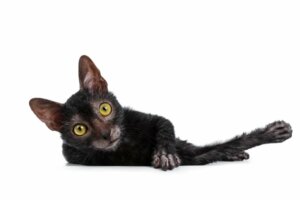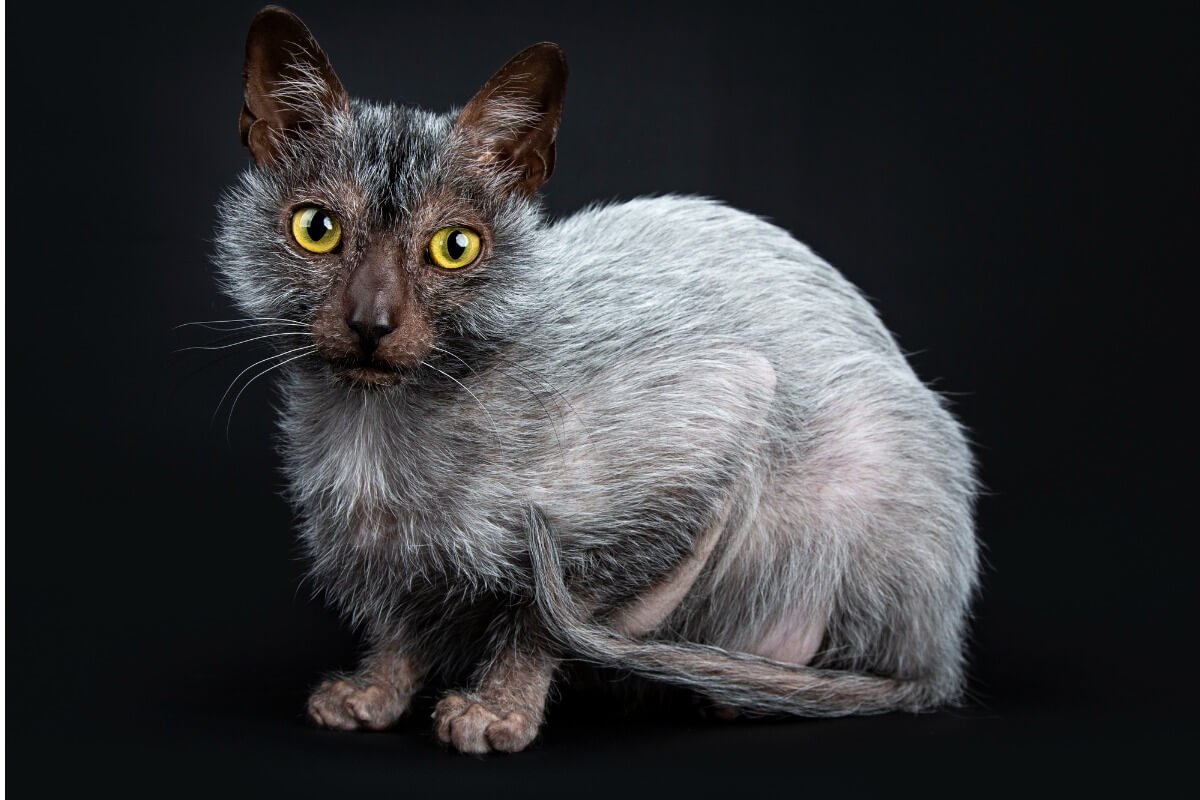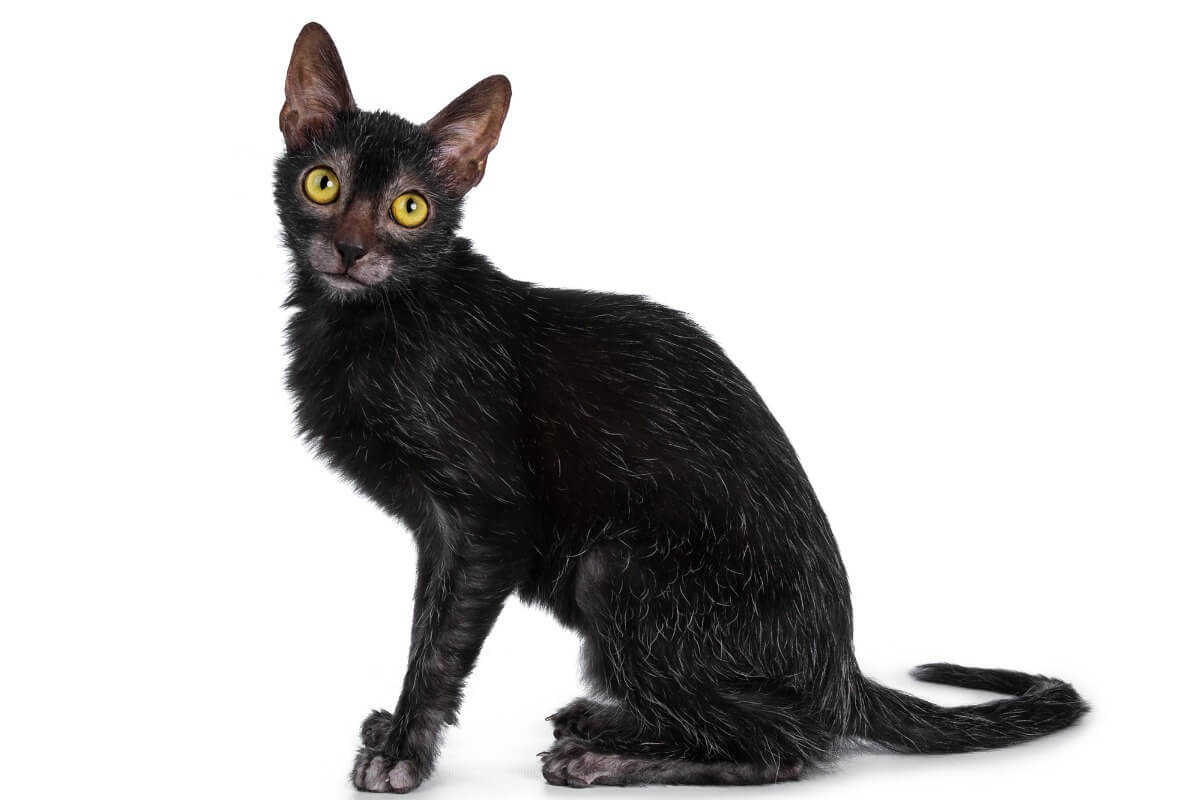Lykoi or Wolf Cat: All About this Breed


Reviewed and approved by the biologist Samuel Sanchez
The feline Lykoi or wolf cat is one of the most unusual breeds of cats around. The word Lykoi means “wolf” in Greek and when you look at this cat you’ll understand why!
This feline is distinguished by having a genetic anomaly that prevents it from developing normal hair and, due to this, people have said that it resembles a werewolf (or should that be werecat?).
However, despite their wild appearance, these cats are friendly, affectionate, and get along well with humans and other animals. If you want to know more about this particular cat, read on.
The origin of the Lykoi or wolf cat
The sphynx or sevon gene can be found in almost all breeds of hairless (or nearly hairless) cats. However, the Lykoi has a gene that’s unique to its breed, as The Cat Care points out. In addition to its strange appearance, this cat is quite a rare specimen in the world, as only about 150 have been recorded as passing the official standard.
Although the word Lykoi means wolf in Greek, this animal received its name from the story of Lycaon, a man who angered Zeus. The Greek god punished him by turning him into a wild canid. Today, the term lycanthropy refers to a delusional condition in which a person thinks they’re an animal.
This variant comes from a natural mutation that arose randomly in the wild population and isn’t a human-made designer breed. In 2010, the wolf cat was discovered as a spontaneous mutation in a wild colony in the United States. The Lykoi gene was shown to be recessive and unrelated to any other known hairless mutation after genetic testing and trial mating.
When the first (purpose-bred) Lykoi was born by crossing two similar-looking Lykoi type felines identified in the wild population in 2011, the wolf cat was officially recognized as a breed. Since its discovery, several countries have reported similar mutations, some of which have been transferred to the gene pool to provide diversity in pedigrees.

Physical characteristics of the Lykoi cat
The Lykoi has hairless patches around its eyes and muzzle, making it resemble a werewolf in transition. This phenotype is expressed thanks to a gene that causes baldness and also causes a black coat pattern with white undertones, better known as roan.
When Lykoi kittens are born, they have a normal coat, with no bald patches or white fur. After 1 or 2 weeks, the kittens begin to lose their fur and look fluffy. After some time, the hair starts to grow so that by 3 to 4 months of age, the kitten has developed its wolf-like appearance.
The wolf cat varies in size from small to medium, however, the exact criteria may differ. On average, this feline weighs between 1.8 and 3 kilos (4 to 6.6 pounds) and its overall build is slender, but strong. Their eyes are huge, bright, and often yellow. Their ears are large and sharp in appearance.
Coat
Although the wolf cat’s coat appears stiff or bristly, it’s actually very soft and silky (although this can change depending on how it’s cared for). The roan color (black with white) is also often altered after the first molt, making it appear more black than white. However, this isn’t always the case and Lykoi cats can have a wide variety of physical characteristics.
Some of these felines appear to be balder, and similar to a sphynx, while others may be almost completely covered with hair. The constant features (regardless of how much the molt has progressed when it’s a kitten) are the ears, the outline of the eyes, the nose, the tail, and the always hairless paws.
This cat can have a coat of any color, but mostly has black hairs with a roan pattern.
Wolf cat behavior
The Lykoi cat is friendly, affectionate, playful, and enjoys spending time with its family. If you live with one of these felines, you’ll realize how intelligent they can be. Like any other cat, it loves to climb and must have toys and objects to help them do this.
This feline is very protective of their family and possessive of their toys. However, if you want them to, they’ll be willing to share even with another cat. Because it’s a curious breed and good at solving problems, it’s a good idea to provide a good supply of interactive elements to constantly rotate and thus maintain mental stimulation.
A very particular feature in their behavior is that they have often been described as acting like a dog. This is because, in the wild, the Lykoi tracks, hunts, and chases just as dogs do. Because of this, you can also teach it to fetch objects.
However, this feline loves to rest with its humans after a long day of play.
How about the Lykoi’s health?
In general, the wolfcat is healthy, although it’s always a good idea to schedule frequent check-up appointments with your veterinarian and you should be aware of any signs of discomfort your cat shows. Because the breed is quite a recent one, we still don’t know how long a Lykoi can live, although it’s believed that it could be up to 20 years if kept healthy.
The only health problem of the Lykoi, due to it not having much fur, is that it tends to have oily skin that’s sensitive to heat and cold. In addition, oil accumulates quickly in their ears and claws because of their sparse fur. You should consult with your veterinarian on how to handle this issue properly.

The Lykoi kitten develops slowly and requires a lot of social interaction to mature into a well-adjusted adult. Without a doubt, it’s one of the newest, rarest, and strangest-looking breeds in the world.
The feline Lykoi or wolf cat is one of the most unusual breeds of cats around. The word Lykoi means “wolf” in Greek and when you look at this cat you’ll understand why!
This feline is distinguished by having a genetic anomaly that prevents it from developing normal hair and, due to this, people have said that it resembles a werewolf (or should that be werecat?).
However, despite their wild appearance, these cats are friendly, affectionate, and get along well with humans and other animals. If you want to know more about this particular cat, read on.
The origin of the Lykoi or wolf cat
The sphynx or sevon gene can be found in almost all breeds of hairless (or nearly hairless) cats. However, the Lykoi has a gene that’s unique to its breed, as The Cat Care points out. In addition to its strange appearance, this cat is quite a rare specimen in the world, as only about 150 have been recorded as passing the official standard.
Although the word Lykoi means wolf in Greek, this animal received its name from the story of Lycaon, a man who angered Zeus. The Greek god punished him by turning him into a wild canid. Today, the term lycanthropy refers to a delusional condition in which a person thinks they’re an animal.
This variant comes from a natural mutation that arose randomly in the wild population and isn’t a human-made designer breed. In 2010, the wolf cat was discovered as a spontaneous mutation in a wild colony in the United States. The Lykoi gene was shown to be recessive and unrelated to any other known hairless mutation after genetic testing and trial mating.
When the first (purpose-bred) Lykoi was born by crossing two similar-looking Lykoi type felines identified in the wild population in 2011, the wolf cat was officially recognized as a breed. Since its discovery, several countries have reported similar mutations, some of which have been transferred to the gene pool to provide diversity in pedigrees.

Physical characteristics of the Lykoi cat
The Lykoi has hairless patches around its eyes and muzzle, making it resemble a werewolf in transition. This phenotype is expressed thanks to a gene that causes baldness and also causes a black coat pattern with white undertones, better known as roan.
When Lykoi kittens are born, they have a normal coat, with no bald patches or white fur. After 1 or 2 weeks, the kittens begin to lose their fur and look fluffy. After some time, the hair starts to grow so that by 3 to 4 months of age, the kitten has developed its wolf-like appearance.
The wolf cat varies in size from small to medium, however, the exact criteria may differ. On average, this feline weighs between 1.8 and 3 kilos (4 to 6.6 pounds) and its overall build is slender, but strong. Their eyes are huge, bright, and often yellow. Their ears are large and sharp in appearance.
Coat
Although the wolf cat’s coat appears stiff or bristly, it’s actually very soft and silky (although this can change depending on how it’s cared for). The roan color (black with white) is also often altered after the first molt, making it appear more black than white. However, this isn’t always the case and Lykoi cats can have a wide variety of physical characteristics.
Some of these felines appear to be balder, and similar to a sphynx, while others may be almost completely covered with hair. The constant features (regardless of how much the molt has progressed when it’s a kitten) are the ears, the outline of the eyes, the nose, the tail, and the always hairless paws.
This cat can have a coat of any color, but mostly has black hairs with a roan pattern.
Wolf cat behavior
The Lykoi cat is friendly, affectionate, playful, and enjoys spending time with its family. If you live with one of these felines, you’ll realize how intelligent they can be. Like any other cat, it loves to climb and must have toys and objects to help them do this.
This feline is very protective of their family and possessive of their toys. However, if you want them to, they’ll be willing to share even with another cat. Because it’s a curious breed and good at solving problems, it’s a good idea to provide a good supply of interactive elements to constantly rotate and thus maintain mental stimulation.
A very particular feature in their behavior is that they have often been described as acting like a dog. This is because, in the wild, the Lykoi tracks, hunts, and chases just as dogs do. Because of this, you can also teach it to fetch objects.
However, this feline loves to rest with its humans after a long day of play.
How about the Lykoi’s health?
In general, the wolfcat is healthy, although it’s always a good idea to schedule frequent check-up appointments with your veterinarian and you should be aware of any signs of discomfort your cat shows. Because the breed is quite a recent one, we still don’t know how long a Lykoi can live, although it’s believed that it could be up to 20 years if kept healthy.
The only health problem of the Lykoi, due to it not having much fur, is that it tends to have oily skin that’s sensitive to heat and cold. In addition, oil accumulates quickly in their ears and claws because of their sparse fur. You should consult with your veterinarian on how to handle this issue properly.

The Lykoi kitten develops slowly and requires a lot of social interaction to mature into a well-adjusted adult. Without a doubt, it’s one of the newest, rarest, and strangest-looking breeds in the world.
All cited sources were thoroughly reviewed by our team to ensure their quality, reliability, currency, and validity. The bibliography of this article was considered reliable and of academic or scientific accuracy.
Care, T. C. (2021, 7 septiembre). Lykoi Cat: All You Need to Know About Werewolf Cat. The Cat Care. Recuperado 8 de noviembre de 2021, de https://thecatcare.org/lykoi-cat/
This text is provided for informational purposes only and does not replace consultation with a professional. If in doubt, consult your specialist.








